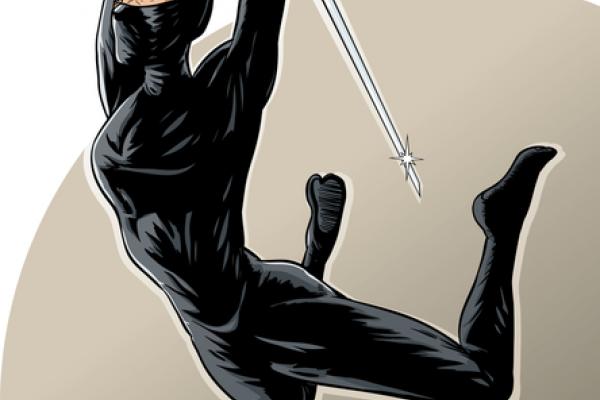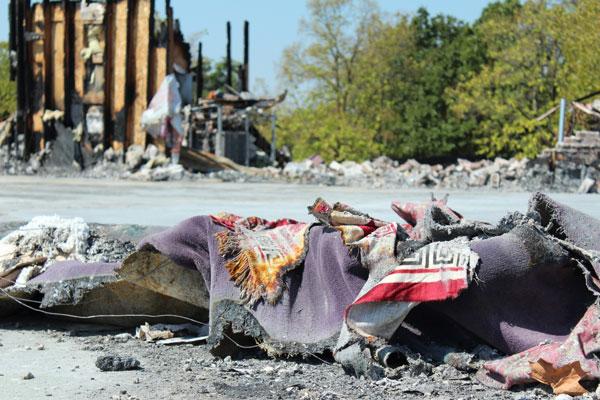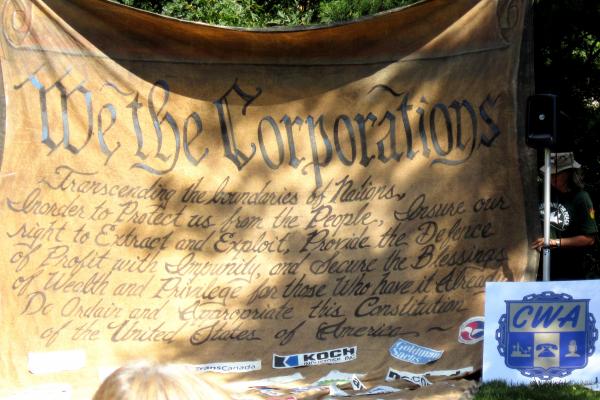No matter how many times we see the little advert (as the English say) before the movie telling us to silence our phones, the temptation to go for our smartphones — to look up, for instance, the name of the other films that one actor (with the butt chin and beady eyes) was in before he became a superhero — is too much to resist.
Or maybe we just can't not text a friend to tell her how the ending of the Dark Knight legend picked up our expectations and pulled a Bane on them (i.e. broke their huge backs, shattering them entirely).
Whatever the reason for putting down the bucket of popcorn and reaching for the squawk box, the fact remains: cell phones are a nuisance to everybody around us — in a cinema perhaps more than anywhere else.
Which is why a London movie theater recently started employing ninjas to combat rogue cell phone use during screenings.
Yes, ninjas.
Micah Zenko, at the Council on Foreign Relations blog, points to a recently declassified report from the Government Accountability Office (GAO) on the spread of drones. The report, Agencies Could Improve Information Sharing and End-Use Monitoring on Unmanned Aerial Vehicles, finds:
“Since 2005, the number of countries that acquired an unmanned aerial vehicle (UAV) system nearly doubled from about 40 to more than 75. In addition, countries of proliferation concern developed and fielded increasingly more sophisticated systems. Recent trends in new UAV capabilities, including armed and miniature UAVs, increased the number of military applications for this technology. A number of new civilian and commercial applications, such as law enforcement and environmental monitoring, are available for UAVs, but these applications are limited by regulatory restrictions on civilian airspace.
“The United States likely faces increasing risks as countries of concern and terrorist organizations seek to acquire UAV technology. Foreign countries’ and terrorists’ acquisition of UAVs could provide them with increased abilities to gather intelligence on and conduct attacks against U.S. interests. For instance, some foreign countries likely have already used UAVs to gather information on U.S. military activities overseas. Alternatively, the U.S. government has determined that selected transfers of UAV technology support its national security interests by providing allies with key capabilities and by helping retain a strong industrial base for UAV production. For instance, the United Kingdom and Italy have used UAVs purchased from the United States to collect data on Taliban activity in Afghanistan.”
In a lecture Thursday evening at Drake University in Des Moines, Iowa, former President Jimmy Carter included drone killings in a list of human rights violations. The Muscatine Journal reported:
“Former President Jimmy Carter said Thursday that America is engaging in — and its citizens are accepting — human rights violations that “would never have been dreamed of” before the terrorist attacks that occurred in this country 11 years ago.
“The nation’s 39th president said the U.S. government under both Republican and Democratic administrations has violated 10 of 30 provisions set out in a universal declaration of human rights that was forged after World War II, including perpetually detaining people in prison without informing them of any charges, providing them access to legal counsel or bringing them to trial and, more recently, by killing people via the use of unmanned drones.
“We have now decided as a nation that it’s OK to kill people without a trial with our drones, and this includes former American citizens who are looked upon as dangerous to us,” Carter told a group of Drake University students involved in a social-justice learning program.”
Because the scientific evidence surrounding climate change is clear, and the implications for humankind are many, the response to these global challenges needs to be persistent, organized, and significant. As Jesus calls upon humankind to “love thy neighbor," and as the Old Testament prophets remind us to strive for justice, we recognize that within a deeply connected world “neighbor” implies all that God has created, and injustice anywhere is injustice everywhere.
So an implication of Jesus’ words and actions is to share and receive the Good News not only on Sunday mornings, but through daily acts of long-term advocacy that promotes sustainable livelihoods. With COP18 in Qatar on the horizon, the time has come when humanity can no longer afford to fight over our resources, and the moment is upon us to prod our elected officials toward legally binding legislation that values the gifts of creation that God has entrusted us to manage.
When the mosque in Joplin, Mo., on the outskirts of town burned to the ground on Aug. 6, the imam’s 4-year-old son knew what to do.
He wanted to build another.
After all, that’s what his family had done with their home after it was destroyed by the tornado that tore through the town a little more than a year earlier.
The imam's family has a new home, but the wait for a new mosque is going to take a while.
A little more than a month after the Islamic Society of Joplin mosque was destroyed by fire, the local Muslim community is moving forward with support from the interfaith community.
But progress is slow.
When the U.S. is negotiating a mammoth, powerful international trade agreement, what do negotiators do when faced with tradeoffs between commercial interests in the U.S. and other U.S. values—such as human rights, preserving the planet we all have to live on, and helping the poor?
That’s the question I asked Carol Guthrie, Assistant U.S. Trade Representative for Public and Media Affairs, last weekend at the Leesburg, Va., resort where the next big thing in trade negotiations—the Trans Pacific Partnership (TPP), basically NAFTA for the Pacific Rim—was taking shape in its 14th round of negotiations.
Many parts of civil society, from the Sierra Club to the Columban Fathers, argue the TPP would have profound negative effects on the environment, public health, human rights, internet freedom, and the global poor, among other things. A number of civil society groups showed last Sunday in Leesburg, where they could sign up for a chance to speak to negotiators—but not, unlike around 600 mostly-corporate insiders, to see the actual text being negotiated. (Members of Congress reportedly are allowed to see the text—but, unlike the insiders, not to download a copy, take notes, or bring an expert staffer with them).
This week's links feature a filmmaking seagull, degrees of Kevin Baconness, 137 origami pigs, and the realization that the iPhone 4S is lighter, faster, and more durable than the iPhone 4S. Wait. What?





